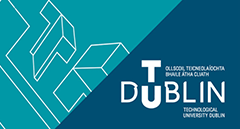Why become a peer-reviewer for IJAP?
This is an opportunity to become involved with a journal with national scope and to help shape the emerging discussions around learning, teaching and assessment in Irish HE. We also invite interested graduate students to review for the journal. Acting as a peer-reviewer is an honorary position and we will acknowledge reviewers names and contributions as part of the Editorial Advisory Panel.
Editorial Board
Editors:
- Dr Roisin Donnelly, TU Dublin
- Dr Claire McAvinia, Trinity College Dublin
- Dr Kevin C. O’Rourke, TU Dublin
Editorial Advisory Panel
- Emma Aherne, Technological University of the Shannon (TUS)
- Dr Brian Barry, Trinity College Dublin
- Dr Serge Bassini, TU Dublin
- Dr Catherine Bates, TU Dublin
- Marese Bermingham, Munster Technological University (MTU)
- Trevor Boland, Dublin City University
- Dr Ken Boyle, TU Dublin
- Dr Ronan Bree, Dundalk Institute of Technology (DKIT)
- Ellen Breen, Dublin City University
- Jennifer Byrne, TU Dublin
- Dr Dara Cassidy, Royal College of Surgeons in Ireland (RCSI)
- Dr Yvonne Crotty, Dublin City University
- Dr Fionnuala Darby, TU Dublin
- Dr Mark Deegan, TU Dublin
- Dr Derek Dodd, TU Dublin
- Dr Deirdre Duffy, TU Dublin
- Dr Julie Dunne, TU Dublin
- Dr Alison Farrell, Maynooth University
- Prof Gerald Farrell, TU Dublin
- Dr Tom Farrelly, Munster Technological University (MTU)
- Geraldine Fitzgerald, Trinity College Dublin
- Prof Noel Fitzpatrick, TU Dublin
- Dr Jason FitzSimmons, Purdue University
- Dr Patrick Flynn, TU Dublin
- Odette Gabaudan, TU Dublin
- Dr John Gallagher, Trinity College Dublin
- Edel Gallagher, TU Dublin
- Brian Gillespie, TU Dublin
- Dr John Gilligan, TU Dublin
- Dr Marta Giralt, University of Limerick
- Maria José Gonzalez, TU Dublin
- Damian Gordon, TU Dublin
- Dr Brian Gormley, TU Dublin
- William Grimson, TU Dublin
- Róisín Guilfoyle, TU Dublin
- Dr Orla Hanratty, Maynooth University
- Sylvia Healy, TU Dublin
- Dr Daire Hooper, TU Dublin
- Prof Bill Hunter, Ontario Tech University
- Dr Claudia Igbrude, PayPal & Trinity Business School
- Rajesh Jaiswal, TU Dublin
- Dr Ita Kennelly, National College of Ireland
- Dr Pat Kenny, TU Dublin
- Caoimhe Kiernan, TU Dublin
- Dr Mary Kinehan, Maynooth University
- Gillian Larkin, TU Dublin
- Dr Máirtín Mac Con Iomaire, TU Dublin
- Dr Cormac MacMahon, TU Dublin
- Dr Nóirín MacNamara, TU Dublin
- Ann Masterson, TU Dublin
- Dr Claire McDonnell, TU Dublin
- Dr Eileen McEvoy, Department of Education
- Dr Colm McGuinness, TU Dublin
- Dolores McManus, TU Dublin
- Prof Barry McMullin, Dublin City University
- Dr Deirdre McQuillan, TU Dublin
- Dr Fiona McSweeney, TU Dublin
- Dr Kerry Meakin, TU Dublin
- Dr Conor Mellon, TU Dublin
- Dr Niall Minto, TU Dublin
- Dr Ziene Mottiar, TU Dublin
- Dr Brian Murphy, TU Dublin
- Dr Tony Murphy, South East Technological University (SETU)
- Dr Caitríona Ní Shé, Trinity College Dublin
- Dr Susanna Nocchi, TU Dublin
- Dr Sue Norton, TU Dublin
- Pat O'Donnell, TU Dublin
- Dr Miriam O'Donoghue, TU Dublin
- Dr Ashley O'Donoghue, TU Dublin
- Dr Muireann O'Keeffe, TU Dublin
- Dr Ciarán O'Leary, TU Dublin
- Nicole O'Neill, TU Dublin
- Dr Pearl O'Rourke, TU Dublin
- Dr Pauline Rooney, Trinity College Dublin
- Dr Barry Ryan, TU Dublin
- Dr Ana Schalk, Trinity College Dublin
- Prof Michael Seery, University of Bristol
- Dr Blathnaid Sheridan, TU Dublin
- Dr P J Wall, TU Dublin
This Editorial Advisory Panel is augmented annually/when new colleagues become involved in peer review work with us.

